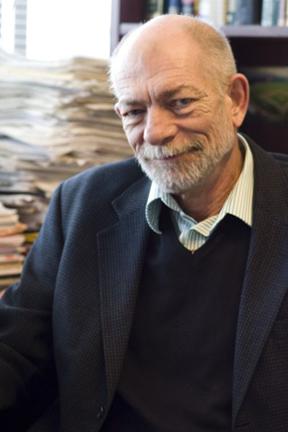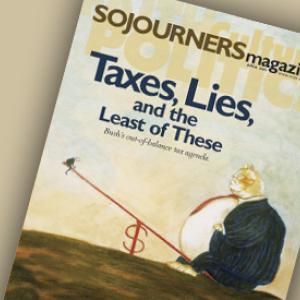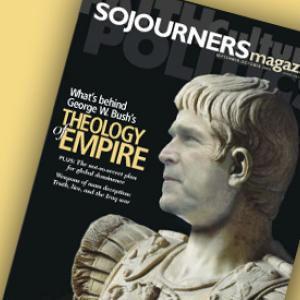
Duane Shank was Associate Editor for Sojourners magazine and was on the staff from 1995 to 2014.
Duane has been active as an organizer and administrator in the peace and justice movement for 35 years, beginning as a draft resistance and antiwar organizer during the Vietnam war. He has worked as a community organizer in the rural south, in interfaith coalitions, and in the nuclear weapons freeze and Central America solidarity movements of the 1980s. His positions have included Associate for the National Inter-religious Service Board for Conscientious Objectors; National Coordinator for the Committee Against Registration and the Draft; Deputy Director and Acting Executive Director for SANE/Freeze; and Research Fellow for the Institute for Policy Studies.
Duane attended Eastern Mennonite University. He is a Anabaptist/Mennonite, and currently an active member and serves on the worship leadership team of the Community of Christ ecumenical congregation in the Mt. Pleasant neighborhood of Washington, D.C. His views on faith and politics have been shaped by (among others), John Howard Yoder, Abraham Joshua Heschel, Martin Luther King, Jr., Dietrich Bonhoeffer, and Oscar Romero.
Duane is married to Ellen Kennel. They have a daughter, Celeste, a graduate of Goshen College, IN, the Medill School of Journalism at Northwestern University, and the University of Chicago Divinity School.
In addition to family, church, and work; his passions are baseball (Washington Nationals), blues (Buddy Guy and Stevie Ray Vaughan) and bluegrass music (Ralph Stanley), and barbecue.
Posts By This Author
Reform, Reduce, Destroy
For political strategist Grover Norquist, tax policy is just a means to a brutish end.
Roots of a Mentor
I first heard of William Sloane Coffin in 1967, when he was a leading spokesperson for "A Call to Resist Illegitimate Authority," a manifesto pledging to "counsel, aid, and abet" young men in resisting the draft.
An Open Letter to Young Activists
Spiritual Leadership
The Project for a New American Empire
Who are these guys? And why do they think they can rule the world?
Road Map or Dead End?
Worth Noting…
The genius of American jazz is using an unexpected note or chord to add an element of surprise when the music goes where you least expect.
Thou Shalt Not Nuke
The church response (or lack thereof) to Bush's nuclearism
The recent agreement to reduce the number of U.S. and Russian strategic nuclear warheads from around 6,000 to between 2,200 and 1,700 sounded like good news. But rather than requiring the dismantling of those warheads, it allows them to be kept in storage—like unloading a shotgun, but keeping the shells in the closet. It's safer and prevents accidents, but in crisis or anger the weapon can still be used. And the real Catch-22 is that the reductions aren't required to take place until 2012, the year the treaty expires. Perhaps celebrations of progress are premature.
Most important, the treaty does not forestall the Bush administration's plans for new weapons and new potential targets. As a "senior administration official" told the press, "What we have now agreed to do under the treaty is what we wanted to do anyway."
When the Bush administration's Nuclear Posture Review was leaked in early March, a flurry of news stories followed. The "war on terrorism" had suddenly gone nuclear! Details of the plan that included the possible targeting of non-nuclear states, the possibility of a first strike use of nuclear weapons, and the development of a "bunker-buster" nuclear weapon that could penetrate deep underground to destroy storage facilities were explained and critiqued.
Yet in the months since then, very little has been heard, other than from national peace organizations. Peace Action, the Council for a Livable World, Friends Committee on National Legislation, Pax Christi, and others issued press releases and action alerts. They have played a crucial role in keeping the issue alive. Indeed, these activist groups mounted a campaign that helped lead to the Senate Armed Services Committee cutting the administration's request for $15.5 million to begin work on the "bunker buster."
In the Court of the Gentiles
Jewish-Christian "dialogue" is too often just that—an intellectual, theological discussion with no grounding in shared experience.
Unleashing a New Moral Energy
Church leaders came together to declare widespread poverty 'morally unacceptable.' And they promised to do something about it.
You’d have to go back a long way to find this much church unity—maybe not to the first Pentecost, but a long way, to be sure. Churches in this country, it seems, have been known more for what has divided them than for what brings them together.
But there’s evidence that’s changing. Christian leaders representing 60 Catholic, evangelical, mainline Protestant, and African-American churches—along with major church-based organizations—gathered on the East steps of the U.S. Capitol in February around a commitment and promise: ending poverty in America.
With the launch of Call to Renewal’s Covenant and Campaign to Overcome Poverty, American church leaders are saying that poverty is no longer a bipartisan political tool but a top-priority nonpartisan issue. "The story today is very simple," observed Sojourners editor Jim Wallis, convener of Call to Renewal. "In a time of record prosperity, the poor are being left behind, but the churches are being drawn together. Today we are launching a Covenant that can change our lives and a Campaign that can change this country."
The Covenant begins with a confession: "The persistence of widespread poverty in our midst is morally unacceptable. Just as some of our religious forebears decided to no longer accept slavery or segregation, we decide to no longer accept poverty and its disproportionate impact on people of color."
Joining Wallis on the Capitol steps were John Carr, representing the U.S. Catholic Conference; Rich Cizik, of the National Association of Evangelicals; syndicated columnist Arianna Huffington; Rev. Wallace Charles Smith, representing the Progressive National Baptist Convention; Rev. Bob Edgar, general secretary of the National Council of Churches; Sharon Daly, representing Catholic Charities USA; Mark Publow, of World Vision; and David Beckmann, president of Bread for the World.

